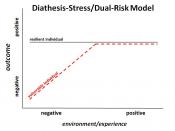Harry Austin
Aetiologies of Schizophrenia
Schizophrenia is a mental disorder that can be identified as a person's inability to separate their imagination from reality. The cause of Schizophrenia has been suggested to have biological and psychological roots; different theories have been proposed to try to understand the aetiology of Schizophrenia.
A key explanation of Schizophrenia that suggests the mental illness is biologically caused is the genetic explanation which indicates that Schizophrenia is genetically inherited; the argument is supported by research such as twin studies, adoption studies and family studies. Family studies were used by Gottesman in 1991, who found that the general population had a 1% chance of developing Schizophrenia but having a sibling who is diagnosed with Schizophrenia increases the probability to 8%, having one parent with Schizophrenia increases the probability to 16% and both parents increases the likelihood to 46%. Additionally, genetic inheritance has been studied through twin studies - for instance, Joseph (2004) found that from all his patients pooled together, monozygotic twin, had a 40.4%
concordance rate of developing Schizophrenia whereas dizygotic twins only had 7.4% concordance.
Whilst there seems to be a concordance between family member's diagnosed with schizophrenia and the likelihood of developing schizophrenia, the concordance could be influenced by environmental factors; the family members all share the same environment and are exposed to similar issues that may externally develop Schizophrenia. It could be argued that Gottesman's findings of an individual's probability of developing Schizophrenia due to genetic inheritance lacks validity as environmental factors are not considered in his research. Joseph's study is helpful in understanding that Schizophrenia can be genetically influenced - however, only 40.4% concordance does not explain Schizophrenia to be completely influenced by genetics otherwise there would be a 100% concordance rate between monozygotic twins.
Biological theories of Schizophrenic aetiologies have further been explored through the neurochemical explanation, which suggests that excess levels of dopamine or oversensitivity to dopamine may result in a person developing Schizophrenia. Neuroleptic drugs such as Thorazine can reduce positive symptoms of Schizophrenia - such as auditory hallucinations and delusions - as they block the activity of dopamine; the correlation between neuroleptic drugs and the reduction of positive symptoms is implicit that Schizophrenia is impacted by neurochemical activity.
Neuroleptic drugs are able to lessen the positive symptoms of Schizophrenia but are less successful in reducing negative symptoms which indicate someone's inability to function properly; this does not provide a broad understanding of why a person develops Schizophrenia as negative symptoms are equally common in Schizophrenic patients. Furthermore, the neurochemical explanation isn't able to determine that excess levels of dopamine do cause a person to develop Schizophrenia - there is simply a correlation between neuroleptic drugs and the reduction of positive symptoms; this does not provide evidence of Schizophrenia being solely influenced by neurochemical activity.
Psychological roots of Schizophrenia have also been explained through the Cognitive approach. Schizophrenia has been suggested as being due to abnormal thinking processes; Hemsley (1993) believed that a person with Schizophrenia has three abnormalities in their cognitive function; they would have difficulty in distinguishing environmentally-generated thoughts and actions from internal forces; their schemas are not able to process new information efficiently; and finally would have an issue with their attention and would not be able to comprehend sensory information efficiently.
Cognitive psychology can work hand-in-hand with biological psychology - in particular, neurochemical activity - to provide a better understanding of Schizophrenia and how it is caused. Meyer-Lindenberg (2010) found a correlation between excess dopamine and memory impairment, which is highly implicit of cognitive dysfunction and neurochemical dysfunction being related in an individual developing Schizophrenia. The cognitive explanation is fairly vague and can be argued to not actually explain how Schizophrenia is caused.
The diathesis-stress argument explains how Schizophrenia develops through an internal disposition that grows due to the influence of an external event. The diathesis-stress argument comprises of a pre-disposition to Schizophrenia that is catalysed by environmental stressors. For instance, a person will have the potential to develop Schizophrenia as they have genetically inherited the diathesis of Schizophrenia - this will only develop in to Schizophrenia if an environmental stressor, such as childhood trauma, activates the disorder.
The diathesis-stress explanation is supported by the Finnish Adoption Study; Tienari et al (1987) assessed a sample of many families and labelled them as either a 'high-risk' or 'low-risk' family of developing Schizophrenia and were labelled as 'disturbed' or 'healthy' in regards to their environmental vulnerability to Schizophrenia. Children in the high-risk disturbed group were found to be more vulnerable to developing Schizophrenia than the high-risk healthy group. Whilst this suggests that Schizophrenia is caused solely through environmental stressors, Tienari et al went on to argue that Schizophrenia develops using diathesis and stressors as the low-risk groups did not develop Schizophrenia. The diathesis-stress explanation displays both biological and psychological arguments collaborating; the use of two typically contrasting arguments presents the explanation as interactionist and therefore providing a greater understanding of Schizophrenia.
Schizophrenia can be argued to be the result of genetic inheritance as previous twin studies have established a concurrence between genetic similarity and probability of developing the disorder; neurochemical activity is also suggested to play a role in Schizophrenic development as there is a strong link between the decrease in positive symptoms and the amount of neuroleptic drugs taken; dopamine may also affect the cognitive functioning of the brain, which in turn could develop Schizophrenia - this exhibits the partnership of biological and psychological arguments in understanding Schizophrenia; the diathesis-stress explanation also demonstrates that both biological and psychological arguments can work together as an aetiology of Schizophrenia as an innate disposition can be triggered by environmental factors.


